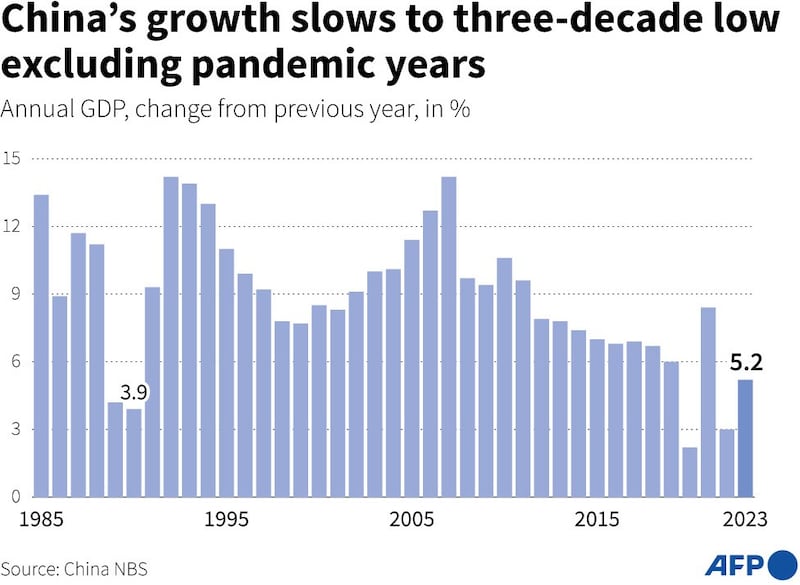China’s economy may never surpass the size of America’s, with long-running predictions of a flip at the top of the world pecking order repeatedly pushed back, a White House official said Tuesday.
With “the strongest post-pandemic recovery and among the lowest inflation of any leading economy in the world,” the United States has been “showing its capacity for resilience and reinvention” while China struggles, U.S. National Security Adviser Jake Sullivan said.
The comments came days after a Hong Kong court ordered the liquidation of Chinese real estate giant Evergrande – which still owes more than US$300 billion to investors – and amid broader problems, with official youth unemployment figures recently as high as 20%.
Speaking at a Council on Foreign Relations event in Washington on the future of U.S.-China relations, Sullivan said he rejected the notion that "the East was rising and the West was falling" and that China's annual gross domestic product was destined to overtake America's.

“For years, economists were predicting that the PRC would overtake the United States in GDP, either in this decade or the next,” Sullivan noted, using an acronym for the People’s Republic of China.
“Now those projections are moving further and further out,” he said. It was becoming possible that “that moment may never come,” he added, with the Chinese economy facing “its own set of challenges.”
U.S. annual GDP currently stands at approximately $28 trillion, compared with China's roughly $18.5 trillion, according to International Monetary Fund figures. America's economy last year also grew at a rate of about 6.3% in nominal terms – that is, not accounting for inflation – which unexpectedly outpaced China's growth of 4.6%.
However, China's economy has grown at a far greater rate than the U.S. economy over the past 35 years: In 1990, China's economy was less than 10% of the size of America's, according to the IMF.
‘An armchair analyst’
Despite his comments, Sullivan said he did not want to “get myself in trouble” or “make news” by hamfistedly evaluating China’s economy, noting that many experts differed markedly in their analyses.
“I just don't see a huge amount of upside in the U.S. national security adviser kind of holding forth as an armchair analyst on China's economy,” he said.
He said he just wanted to reject “the conventional wisdom about relative trajectories of the U.S. and the PRC.”
The idea that China could only rise and that the United States was destined to recede had been “openly proclaimed” in Beijing until recently, Sullivan explained, but President Joe Biden had long stressed this was not a fundamental characteristic of ties.
“The president didn’t accept that, I didn’t accept that and our team did not,” he said. “We continue to push back against this idea.”
The U.S. national security adviser also defended a slew of policies intended to shore-up national security by reducing America's trade reliance on China and by subsidizing key industries such as microchip manufacturing, which Beijing has said is economically damaging.
Sullivan said he discussed that with Chinese Foreign Minister Wang Yi in Bangkok last week, with both sides offering views about where "the boundary between economics and national security" should lie.
But he acknowledged they did not have “completely converging perspectives” on the issue, or even who was most at fault.
“For a very long time, the PRC has taken measures on explicit grounds of national security that have had an adverse impact on American workers, American businesses, and the American economy,” he said. “So this cannot be a one-way street of a conversation.”
Edited by Malcolm Foster.
